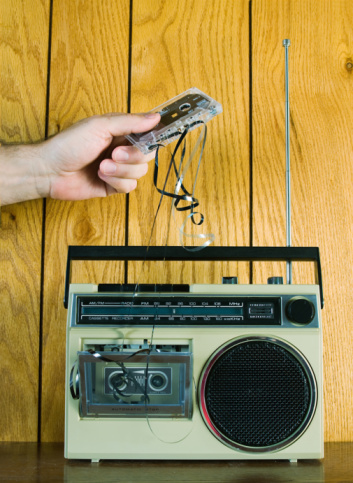Imagine you’re on the treadmill, on the home stretch of a 5-mile run. Your exhausted body is screaming at you to stop, to give up, and for a second, you almost listen. Almost. Instead, you scroll to that one song on your mp3 player (we all have the one), press play, and suddenly the energy and motivation to finish is coursing through your veins like adrenaline. Now imagine if you were biologically wired to be unable to feel this kind of experience. Sure, you’re healthy and sound of mind, but silence and music do the same thing for you, in terms of emotional payoff . No sentimental tug on the heartstrings, no euphoria, no inspiration, no… well, nothing. For people who are “diagnosed “with musical anhedonia, this is the world they live in– one in which music just doesn’t mean a thing (even if it’s got that swing, hollaa Swing Kid Christian Bale).
It turns out that about 1-5% of the global population are affected by this curious affliction, one that prevents them from registering an emotional response to music but doesn’t interfere with their reactions to other stimuli like sex and food. (FYI: musical anhedonia is not be confused with amusia, which is a cognitive version of tone-deafness. If you can’t carry –or recognize– a tune to save your life, you’re going to have find something else to blame.) This phenomenon was recently discovered, quite by accident, when psychologists at the University of Barcelona conducted a survey of students and charted their emotional and physiological responses, like increases in heart rate and sweating, to musical stimuli. As most people (hopefully) know, that perfect note or riff can send shivers down the spine. Except not, apparently. At least for some of the participants in the study. Further testing revealed that the lack of emotional and physical response was limited to music alone; according to Dr. Josep Marco-Palleres, “all the participants in the three groups had the same sensitivity to reward for other kinds of stimuli – food, sex, money.”
The concept of “reward” isn’t one that often comes to mind when we consider the act of listening to music. Why do most people listen to music, though? Because the act, like smoking a cigarette for an addict or eating something extra-scrumptious for a foodie, elicits a pleasurable response. (Granted, that pleasure might be considered a bit “sick” when we torture ourselves with songs about heartbreak when we’re going through it, but still, pleasure is pleasure.) And, like anything that makes us feel good, there runs a risk for addiction.
Okay, we’re not claiming that music poses the same threats for addiction that drugs or alcohol do. Just give us the benefit of the doubt for a second. Think about how many times you’ve sat in your car, stuck in traffic, flipping through radio stations or skipping tracks on a playlist, searching for a song that will make the experience a bit more bearable. You listen to the opening bars of a few of them but, really, none of them does it for you. They’re “old.” None of them satisfies your craving, so to speak. Sure, Beyonce’s “Drunk in Love” might have been your jam for a good minute, but the emotional payoff you get from it just isn’t the same as it was when the song first blared from your car speakers. You need something different. In short, you need a new reward, a new fix. (See it now?) Music-streaming services like Pandora, Spotify and Sonos greatly increase the amount and kinds of music users have access to, but also make it that much harder to find the perfect song and satisfy the fix that burns in our ears (oh, the perils of consumer choice). We might not have realized it yet but, more than ever, the act of listening to music has become one centered primarily on instant gratification. Now, we can hear what we like when we want to, until that song or artist or album gets too “old” and then we move on to the next. Pandora, Spotify and Sonos just shorten the length of this process considerably. This isn’t a bad or detrimental thing, necessarily, but it’s universal enough of a phenomenon that it should cause us to question how our ADHD-like consumption of music affects the way we judge and assign cultural capital to artists, songs and even art in general.
So, the next time you’re ready to throw a fit in traffic because your playlist shuffle keeps coming back to that one song that you “hate” or is “too old,” slow your roll and think about the situation and emotions that led you to put that song on your mp3 player in the first place. You liked that song at one point in time, until the urge to satisfy your need for instant gratification and newness caused you to move on to the next without looking back. The song hasn’t changed, so what has?
Really, at the end of the day, just take a moment to appreciate the fact that you even care. Not everyone does. Not everyone can.

















